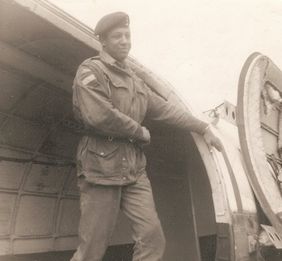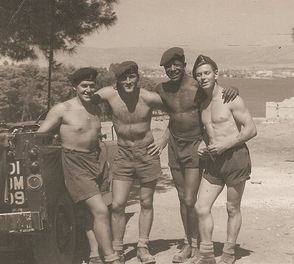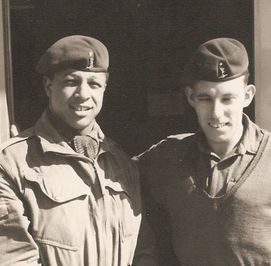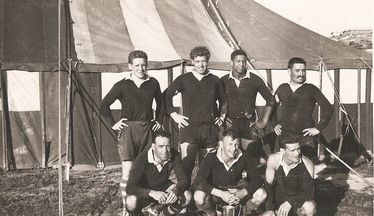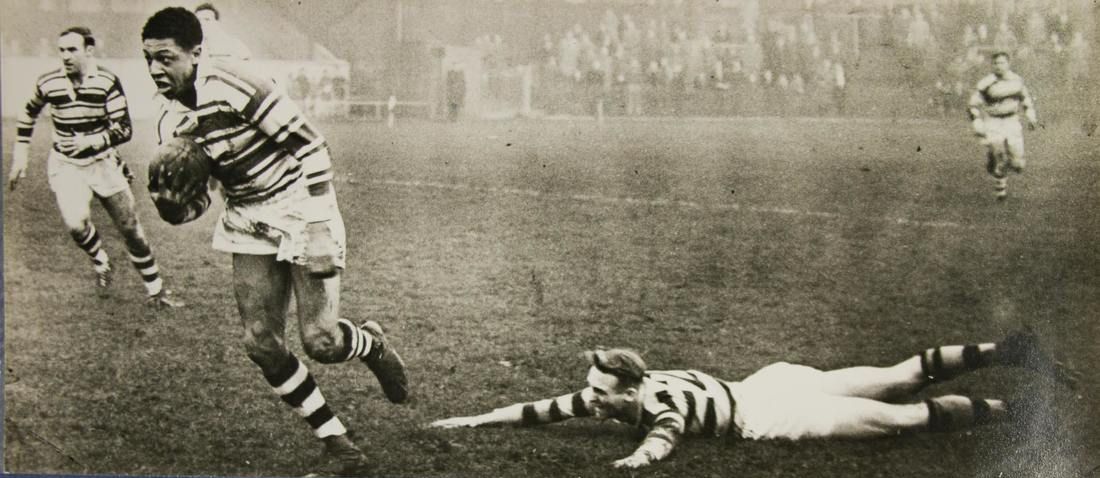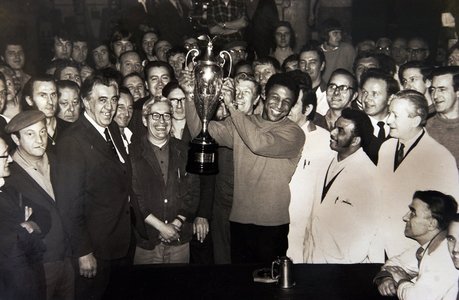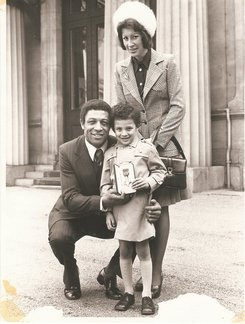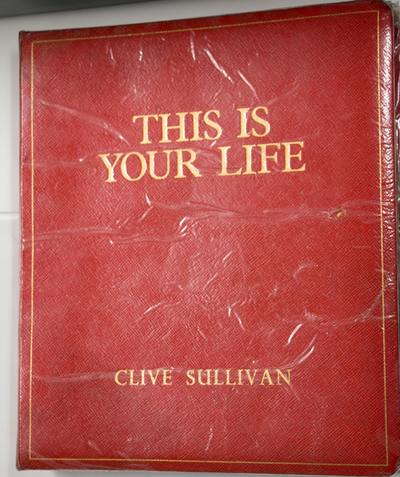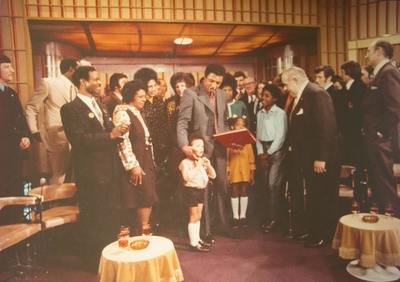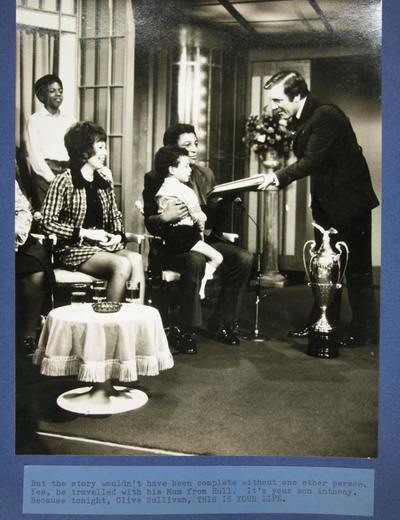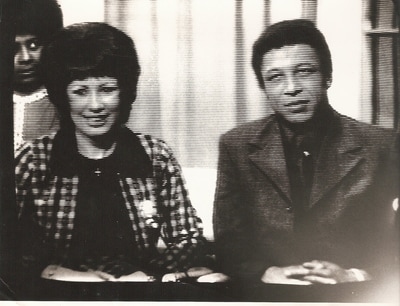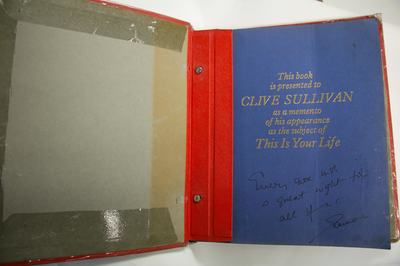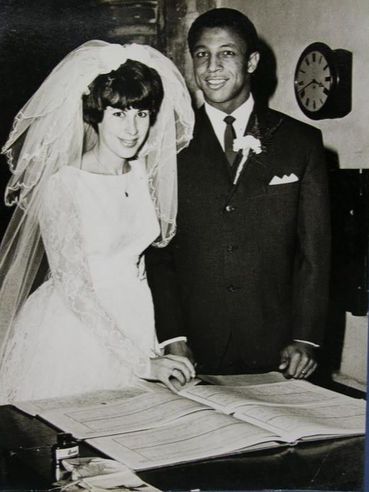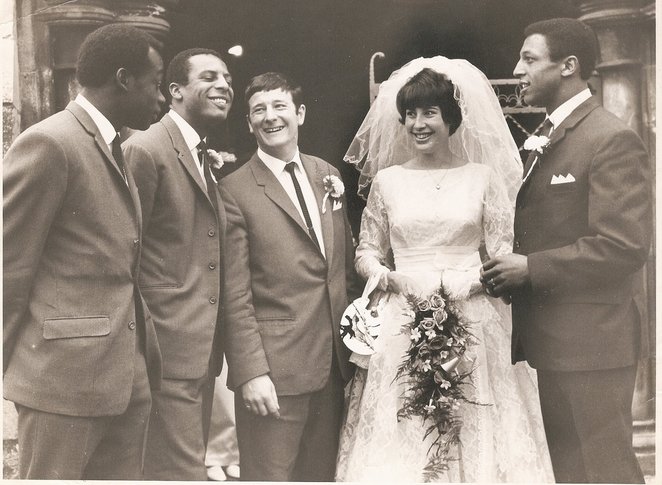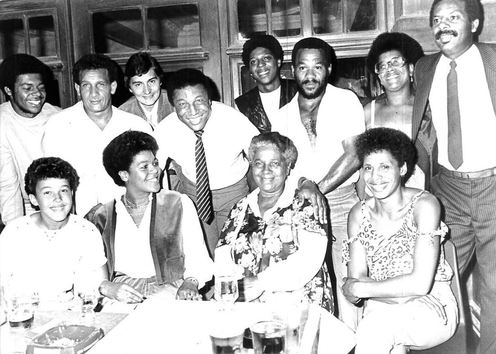Clive Sullivan (1943-1985) By Rebecca Nelson
Although not born and bred in Hull, Clive Sullivan has become one of the most well-known characters in the city. From the only Black family in a small suburb of Cardiff, Clive faced adversity through his early life to become one of the best rugby players that Hull has ever had, as well as being the first Black captain of any British international sports team. Sadly Clive passed away at an early age, but his legacy is very much still felt in the area.
Clive was born on 9 April 1943 in Splott, an inner-city suburb of Cardiff. His mother’s family was of Antiguan descent, but his father was Jamaican. They were the only Black family in the area. Clive began playing rugby at school, but from the age of fourteen his teenage years were plagued with injuries that required him to have several operations on his knees, feet and shoulders. Doctors thought it unlikely that Clive would ever be able to walk normally again. A rugby career must have seemed like a distant dream at this time, but Clive’s story is one of grit and determination.
After leaving school and working for a while as a motor mechanic, he joined the British Army in 1961. He completed his basic training at Catterick in North Yorkshire and went on to be trained as a radio operator. Once qualified, he then volunteered to become a paratrooper. After gaining his wings, he joined 216 Parachute Signals Squadron at Farnborough, Hampshire. He saw active service with his unit in Nicosia, Cyprus in January 1964 and was subsequently attached to the United Nations Peacekeeping Force and was awarded the United Nations Medal for his service.
After leaving school and working for a while as a motor mechanic, he joined the British Army in 1961. He completed his basic training at Catterick in North Yorkshire and went on to be trained as a radio operator. Once qualified, he then volunteered to become a paratrooper. After gaining his wings, he joined 216 Parachute Signals Squadron at Farnborough, Hampshire. He saw active service with his unit in Nicosia, Cyprus in January 1964 and was subsequently attached to the United Nations Peacekeeping Force and was awarded the United Nations Medal for his service.
Whilst training at Catterick Clive was picked for an inter-corps rugby union match, mainly on the basis of him being Welsh. The army were ignorant of his previous injuries and he agreed to play in the match to avoid drawing attention to his frailties, but planned to play badly to avoid being picked again. However, his natural sportsman’s instincts took over and after scoring a long distance try with no ill effects, he decided to make the most of the army training to further progress his hopes of playing rugby.
At the age of 17, he was granted a trial for Bradford Northern Rugby League club having been spotted in his Army matches. Bradford were not taken with Clive, however, but the touch judge approached him following the game and offered him a trial at Hull FC. During this he scored three tries and was dubbed ‘Mr X’ by the Hull Daily Mail. He signed as a professional player the very next day.
At the age of 17, he was granted a trial for Bradford Northern Rugby League club having been spotted in his Army matches. Bradford were not taken with Clive, however, but the touch judge approached him following the game and offered him a trial at Hull FC. During this he scored three tries and was dubbed ‘Mr X’ by the Hull Daily Mail. He signed as a professional player the very next day.
|
Unfortunately Clive’s first three seasons were restricted by army duties, three knee operations, and a near fatal car crash in October 1963, although he returned to play again just three months later.
Despite this, Hull saw his potential and continued to play him in league matches. He left the army after a spell in Cyprus in 1964 so now free of his army commitments, he returned to Hull in time to play the last game of the season. |
In 1967 Clive scored an astounding twenty-eight tries in twenty-eight matches and made his international debut for Great Britain scoring two tries against the French. The following year saw him score seven tries in a single match against Doncaster. He also toured Australasia and New Zealand, but was unable to play in many matches due to injury. His international career peaked in 1972, when he was selected to be captain of Great Britain’s rugby league team – the first Black player to lead a British national team in any major sport – and led the squad that won the world cup in France. Clive scored what some rugby fans consider the most famous try in the history of the World Cup to level 5-5 against Australia in the final, after a length of the field run. He also captained the Welsh rugby team to finish third in the 1975 Rugby League World Cup. Overall, Clive represented Great Britain seventeen times, appearing at three World Cups in 1968 and 1972 with Great Britain, and in 1975 for Wales.
After a short stint on the coaching team at Hull FC in 1973-4, Clive shocked everybody in Hull by switching to rival team Hull Kingston Rovers (Hull KR). Whilst there he won a championship medal in 1979. His 113 tries in six seasons at Hull KR made him the only player to score 100 tries for both Hull clubs. Somewhat unexpectedly, at the age of thirty nine, he returned to Hull FC in 1982 and played there until his retirement in 1985. During his career he played a total of 352 games for Hull FC, scoring 250 tries. In his 213 games for Hull K.R. he scored 118 tries. A record which qualifies him as a total sporting legend - a status cemented when he appeared on the This is Your Life television programme in 1973 (see photographs below. You can also see Clive’s ‘red book’ on display at the Wilberforce House Museum in Hull).
Six months after retiring, Clive tragically passed away from liver cancer at the age of forty-two. His funeral was a mass of red and black, and white and black shirts - rival fans united in grief. For a city then dominated by sporting rivalries between two top flight rugby teams the fact that Clive had not been born in the city did not matter. "He was one of us" lamented a correspondent in the Hull Daily Mail. Strikingly, both Clive's Welsh and Black identities were also irrelevant. He had after all, like so many rugby players, migrated from South Wales to play for Hull. Clive was indeed one of a number of people cherished in the post-industrial landscape of Hull who were adopted by the town since its expansion as a key maritime port in 1783. As his wife Rosalyn observed after his death: "Everyone was so fascinated by Clive that they wanted to touch his hair, my mum being the first. ... He was always very comfortable with his colour. He always said to me that it was an asset because it made him stand out. He very quickly identified with the people of Hull. They'd had tough lives, especially the fishermen, and, coming from a humble background himself, he understood that. He was loved by everyone in Hull, which was a great tribute to him because there's such fierce rivalry between the two rugby clubs” (Peter Jackson, Triumph and Tragedy: Welsh Sporting Legends (Edinburgh & London: 2012).
The main approach road into the city from the Humber Bridge was named after him in 1986 and the two teams still play an annual pre-season friendly in competition for the Clive Sullivan cup. Clive’s family continue to live in Hull, and his son Anthony played rugby for Hull KR and for Wales during the 1990s.
The main approach road into the city from the Humber Bridge was named after him in 1986 and the two teams still play an annual pre-season friendly in competition for the Clive Sullivan cup. Clive’s family continue to live in Hull, and his son Anthony played rugby for Hull KR and for Wales during the 1990s.
Photographs of Clive Sullivan from ITV's This is Your Life (1973)
Click to enlarge
Click to enlarge
Memories of Clive by Rosalyn Daniel (Sullivan)
One Sunday night in July 1964 my friend and I went to The Duke of Cumberland at Ferriby as The Aces were playing (one of the best Hull groups at the time). My friend Fiona was going out with one of the band members. The landlord allowed us in even though we were both 17 years old as we promised we would not drink alcohol. The music was great, the room was packed and the evening was going well. Unfortunately the bitter lemon was not going down well so I produced my bag of sherbert lemons and handed them around the girl at my table, then a hand appeared from behind me and coolly took a sweet. I looked around and saw a handsome man with a big smile on his face. This was my first meeting with the man who was to become my husband.
|
The ice was broken and we chatted and I was smitten. The guy who was going out with my friend had brought Clive and as he was taking my friend home, he offered to take me home to Welton. I learned that his name was Clive Sullivan but as I lived in a small village and had no interest in football or rugby was none the wiser. Clive asked if he could take me out the following evening as the Aces were playing in Bridlington, I agreed. The meeting and the evening went well and we got on very well. On the way home Clive asked me to marry him and as I thought it was a joke I refused! We then began to see each other regularly.
As I lived in a small village where everyone knew everyone and I knew that this man was going to be special to me I had to tell my parents that I had met a man and that he was 'coloured'. My mum asked how dark he was as we just didn’t see Black people in the village. The lady who lived opposite us was Indian, married to a white man and they had two sons around my age so the only comparison I had was the two boys. I explained he was similar to them. I was quite emotional as I did not want them to dislike him because he was not white. I had arranged for Clive to come to my home the next evening to meet my parents so they could see what a lovely man he was. |
He arrived the following night, for a night in with the family (I was the second oldest of 7 children, 5 girls and 2 boys). Clive was dressed in a suit, white shirt and tie (very formal). Introductions done, with his winning smile, charming my mother and little sisters, he sat straight-backed on a dining chair. Mum and dad chatted and then explained they had to leave due to a meeting being called at short notice and that this was not due to the fact that Clive was there! Very embarrassing! My sisters Libby and Lorraine were intrigued by Clive and I think fell in love with him straight away!
By the time mum and dad returned Clive had relaxed, jacket off, tie removed and sat comfortably in an armchair. My parents commented that they were so pleased to see him so relaxed!
Clive and I continued to see each other and he explained that he trained two nights a week as he played rugby on a weekend. He did not tell me he was professional or that this was a big thing in Hull. I presumed it was just a ‘man thing’ on a Saturday afternoon.
By the time mum and dad returned Clive had relaxed, jacket off, tie removed and sat comfortably in an armchair. My parents commented that they were so pleased to see him so relaxed!
Clive and I continued to see each other and he explained that he trained two nights a week as he played rugby on a weekend. He did not tell me he was professional or that this was a big thing in Hull. I presumed it was just a ‘man thing’ on a Saturday afternoon.
The only thing I knew about rugby was an essay I wrote at school as we were given a choice of titles ‘muddied oafs’ or ‘panelled fools’. I had seen on TV these muddy men chasing a funny shaped ball and so that ‘muddied oafs’ would have such an impact on my life!
Later on Clive explained that he would be playing a game of rugby on the following Saturday and invited me along. I asked would I be OK wearing casual jeans and he explained that I would be better going smarter. The evening before the match Clive came to my house but to me he seemed very quiet and distracted, I was to learn that this would be the pattern up to his very last game!!
Match day finally came and we arrived at the Boulevard. As we approached the gates people came towards Clive asking for his autograph. It finally dawned on me that this game of rugby was much bigger than I had imagined.
Clive and I continued seeing each other and he became closer to my family. We often took my youngest sister out with us as she was only a toddler. Clive enjoyed family life as he liked me coming from a large family with two sisters, one brother, two step sisters and one step brother. His mum had brought the four Sullivan children up single handed and Clive was a gentleman in every way. Libby and Lorraine my two younger sisters loved Clive and as I learned later used to creep out of bed and hide on the landing to watch Clive and I kissing goodnight.
My mum and my sisters’ first request of Clive was to feel his hair which was so different in texture to ours. He did not mind at all and took it all in good part.
In the beginning I felt my father was not too happy about his daughter going out with a Black man but as word got around the village and the men in the village club got to know who the Black man was and his reputation on the rugby field I felt my dad then softened and eventually became proud of Clive the man, not Clive the ‘Black man’. I feel I was a ‘nine day wonder’ in the village as this was unusual in Welton in the sixties as there were no Black families in the village and not many in Hull. The fact that we were a mixed race couple did not bother me whatsoever, but I must admit I soon learned that this was not acceptable to some people and could feel this disapproval on walking into a restaurant or public bar. I just hoped that eventually people’s opinions would change and I still have that hope.
I learned more about Clive and that he had been in the army. My elder sister was also in the army in the Signals as Clive had been, and when Angela came back to Hull after serving in Hong Kong Clive and Angela learned they had both been stationed in Catterick at the same time – what a small world.
As I became friendlier with the other wives and girlfriends we had a good social life. The players all got on really well and Cyril Sykes and his wife sort of looked after us and often had get-togethers at their home. Clive and I became very close to Terry Devonshire and his girlfriend Pat Heath and often went out as a foursome. The players always had a lot of banter going on between them; constantly took the mick out of each other. Saturday nights would find lots of players and their wives or girlfriends going out together. There was a great spirit amongst all the players, even though the team were not doing so well with their results. Clive continued to shine and it was evident he was popular with the crowd at the Boulevard.
Later on Clive explained that he would be playing a game of rugby on the following Saturday and invited me along. I asked would I be OK wearing casual jeans and he explained that I would be better going smarter. The evening before the match Clive came to my house but to me he seemed very quiet and distracted, I was to learn that this would be the pattern up to his very last game!!
Match day finally came and we arrived at the Boulevard. As we approached the gates people came towards Clive asking for his autograph. It finally dawned on me that this game of rugby was much bigger than I had imagined.
Clive and I continued seeing each other and he became closer to my family. We often took my youngest sister out with us as she was only a toddler. Clive enjoyed family life as he liked me coming from a large family with two sisters, one brother, two step sisters and one step brother. His mum had brought the four Sullivan children up single handed and Clive was a gentleman in every way. Libby and Lorraine my two younger sisters loved Clive and as I learned later used to creep out of bed and hide on the landing to watch Clive and I kissing goodnight.
My mum and my sisters’ first request of Clive was to feel his hair which was so different in texture to ours. He did not mind at all and took it all in good part.
In the beginning I felt my father was not too happy about his daughter going out with a Black man but as word got around the village and the men in the village club got to know who the Black man was and his reputation on the rugby field I felt my dad then softened and eventually became proud of Clive the man, not Clive the ‘Black man’. I feel I was a ‘nine day wonder’ in the village as this was unusual in Welton in the sixties as there were no Black families in the village and not many in Hull. The fact that we were a mixed race couple did not bother me whatsoever, but I must admit I soon learned that this was not acceptable to some people and could feel this disapproval on walking into a restaurant or public bar. I just hoped that eventually people’s opinions would change and I still have that hope.
I learned more about Clive and that he had been in the army. My elder sister was also in the army in the Signals as Clive had been, and when Angela came back to Hull after serving in Hong Kong Clive and Angela learned they had both been stationed in Catterick at the same time – what a small world.
As I became friendlier with the other wives and girlfriends we had a good social life. The players all got on really well and Cyril Sykes and his wife sort of looked after us and often had get-togethers at their home. Clive and I became very close to Terry Devonshire and his girlfriend Pat Heath and often went out as a foursome. The players always had a lot of banter going on between them; constantly took the mick out of each other. Saturday nights would find lots of players and their wives or girlfriends going out together. There was a great spirit amongst all the players, even though the team were not doing so well with their results. Clive continued to shine and it was evident he was popular with the crowd at the Boulevard.
|
Clive had had problems with his legs as a youngster and his legs looked quite delicate and thin but as he said “you don’t see fat on a race horse’s legs”, but injuries were still plaguing him.
Communications were not as they are today and we did not have a telephone at home but relied on our neighbour to knock on the wall if there was an urgent call for the family - no mobile phones then. This particular day Clive arranged to pick me up as he was not playing as he had injured his knee, he did not turn up and I became very worried. I asked the neighbour if I could use her phone and eventually found out that Clive had been to see a specialist that had been arranged by the Club and was admitted to hospital and operated on that day. He had had an operation on his knee to repair a torn cartilage. He was in hospital for ten |
days and was on crutches when he came out. So very different from today when keyhole surgery means it is a day case and can be back playing 2-3 weeks later. Another problem was that players were part-time professional and all had a full time day job because pay for rugby was not great, so when a player was injured they lost their full time wage and the pay for rugby.
Clive was not a ‘patient’ patient and would become frustrated and down because he was not fit. I had to keep his spirits up and encourage him as over the years he suffered more than his fair share of injuries. I got used to this and to massaging various injured legs etc. I have even gone running with him so he could measure his fitness.
As I previously mentioned Clive was really nervous before a game and we decided that the best way to deal with his nerves and short temper before a game was to go to the cinema on a Friday night otherwise we ended up not speaking every Friday night which was not good.
Clive was not a ‘patient’ patient and would become frustrated and down because he was not fit. I had to keep his spirits up and encourage him as over the years he suffered more than his fair share of injuries. I got used to this and to massaging various injured legs etc. I have even gone running with him so he could measure his fitness.
As I previously mentioned Clive was really nervous before a game and we decided that the best way to deal with his nerves and short temper before a game was to go to the cinema on a Friday night otherwise we ended up not speaking every Friday night which was not good.
|
Clive and I became engaged, mum overheard a lady say on hearing the news, “Oh dear, what a shame, such a pretty girl”. Unfortunately people still had an issue with white marrying Black! We planned to marry in October 1966, Clive and I went down to Cardiff in the summer to meet up with Clive’s mum and brothers and sisters. We were invited to a family party at his uncle’s house, I was the only white person present and it brought home to me how difficult it must be to be Black in a place that was in the main white. Clive was always so at ease with anyone he met although he could be shy and preferred to stay in the background. Clive’s family were lovely and I felt very much at home at Clive’s and Clive did at mine.
Our wedding day was on a match day and I felt very special that Clive would give up a game of rugby to marry me! We got married in St |
Helen’s Church at Welton with the reception at the village Hall and in the evening of course The Aces played! Terry Devonshire was best man. My sisters Angela, Libby and Lorraine and Clive’s sister Sharon were bridesmaids. Hull FC were playing Bramley at home and thankfully won without the services of Terry and Clive but I know that they were both impatient to know the score come four thirty!. Later on the team arrived and Clive myself and all the guests had a brilliant day and wonderful life.
